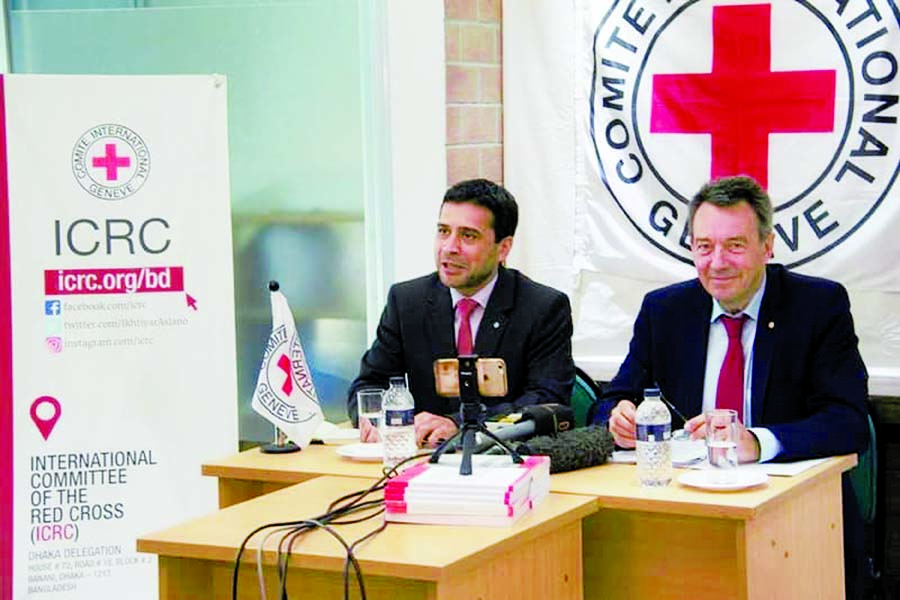
Diplomatic Correspondent :
President of International Committee of the Red Cross (ICRC) Peter Maurer on Tuesday laid emphasis on “responsible leadership” to resolve the Rohingya crisis and help Rohingyas go back to Myanmar from Bangladesh with all their rights.
“I was convinced during talks with the Myanmar and Bangladesh governments as they have recognised that there is a problem, now needs political willingness to address it,” he said.
Peter Maurer made the remarks at a press briefing held at the Dhaka office of the ICRC after a week long visit to northern Rakhine of Myanmar and Rohingya refugee camps in Cox’s Bazar.
International Committee of the Red Cross (ICRC) Bangladesh Head of Delegation Ikhtiyar Aslanov was present at the conference.
During his visits, Peter Maurer met Myanmar President Win Myint, State Counsellor Aung San Suu Kyi, and Senior General Commander-in-Chief of the Defence Services Min Aung Hlaing. In Bangladesh, he met Prime Minister Sheikh Hasina.
The ICRCD chief also met Foreign Minister AH Mahmood Ali and Home Minister Asaduzzaman Khan on Tuesday.
“Conditions to return will require not only humanitarian and mitigating activities, but also effective political steps towards ensuring freedom of movement, access to basic services, freedom to undertake economic activity and access to markets in Rakhine and most importantly trust in security arrangements for returnees,” he said.
Maurer said, “We have also seen the excellent recommendations from Kofi Annan’s Commission, which we support. Humanitarian organisations too are doing their best to alleviate the suffering.”
“But so far, despite all the talking and all the efforts, too little has changed for the people here,” he said.
Maurer who travelled both sides of the border — the northern parts of Rakhine State where people had fled violence and the refugee camps in Cox’s Bazar – said he is leaving the region with “a sober assessment” of the situation.
Nothing has changed for Rohingyas despite the fact that there is no shortage of initiatives to solve the crisis, he said.
He added: “There is a lose-lose situation for people as they are suffering in both sides of the border — northern Rakhine State and the camps in Cox’s Bazar.”
“I met those who stayed and those who left and it is clear that people are suffering on both sides. People lack secure housing, electricity, latrines, medicine and healthcare. There are few options for people to earn an income to allow them to move beyond aid and emergency conditions.”
“Over a million people live in misery, held hostage to a profoundly unsettling contradiction,” he said.
“Those sheltering in the camps in Cox’s Bazar live in shocking conditions that violate human dignity. With the monsoons arriving, their lives will only get worse. They cannot stay and they cannot return,” he said.
“I cannot claim that life for those in Rakhine State is significantly better. In this remote, rarely visited area, we drove through the areas where villages once stood. Little remains now and the vegetation is rapidly reclaiming the land. In other parts, former schools and health centres stand empty,” said Maurer.
“In one village I visited, less than a quarter of the population remains, only 2,000 of the original 9,000 villagers. I spoke with all communities, Muslim, Buddhist, and Hindu. They described how the social fabric and local economy have been destroyed, making people entirely reliant on humanitarian aid.”
“The conditions are simply not there for large numbers of people to return home,” the ICRC president recounted.
“For humanitarian reason alone, something has to change. Our collective bet efforts must break this intractable situation and address its root causes. The ICRC is keen to play its part.”
“The ICRC will continue to play its part in responding to this humanitarian crisis in both Myanmar and Bangladesh,” said Maurer.
Over 700,000 Rohingya have escaped brutal military crackdown since late August last year. Rohingya were reportedly killed, women raped and their houses burnt in the campaign, which was termed by the UN as textbook case of ethnic cleansing.

